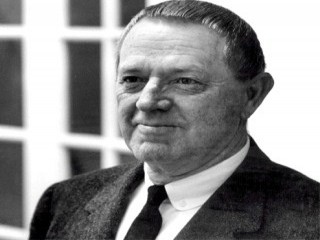
Erskine Caldwell biography
Date of birth : 1903-12-17
Date of death : 1987-04-11
Birthplace : White Oak, Georgia, U.S.
Nationality : American
Category : Famous Figures
Last modified : 2011-04-18
Credited as : Writer and best-selling author, With All My Might , Tobacco Road, God's Little Acre
The American writer Erskine Caldwell was one of the best-selling authors of all time. His novels and stories are distinguished by their brutally realistic depiction of the rural South; his early work was outstanding for a sexual candor uncommon in its time.
Erskine Caldwell was born in backwoods Coweta Country, in the town of White Oak, Georgia, on Dec. 17, 1903. His father was a Presbyterian minister, and the family moved frequently throughout the South. Caldwell's schooling was fragmentary; he attended high school sporadically and took college courses at the University of Pennsylvania, at Erskine College, in South Carolina, and at the University of Virginia.
As a young man, he worked in Atlanta, Memphis, New Orleans, Philadelphia, and Baltimore as a mill laborer, farmhand, cotton picker, cook, stagehand in a burlesque house, and book reviewer. In 1925 he left the University of Virginia to become a reporter for the Atlanta Journal, and he married the first of his four wives, Helen Lannigan, with whom he had two sons and a daughter. Discovering that newspaper work left him no time for creative writing, Caldwell retreated to Maine for four years. His prolific career as an author was launched by The Bastard, (1929), Poor Fool (1930), and American Earth (1931).
But it was the 1932 publication of Tobacco Road that assured Caldwell's success. The novel depicts the life of Jeeter Lester, a Georgia sharecropper, and his family as they stumble through a series of sexual and financial misadventures, culminating in the destruction by fire of their home and themselves. The novelistic treatment is comic, the structure is episodic, and the rural southern types appear childish, grotesque, and, ultimately, pathetic.
In 1933 Tobacco Road was dramatized and ran for a record-breaking seven years on Broadway, despite an obscenity charge that was brought against it by the New York Society for the Suppression of Vice. The charge was dismissed, as was a similar charge against Caldwell's next novel, God's Little Acre (1933), the story of Ty Ty Walden, a Georgia dirt farmer, and his sons and daughters, and the barren, useless acre of land that he dedicates to God. As in Tobacco Road, Caldwell's theme is the folly and promiscuity of rural southerners. God's Little Acre is one of the all-time best sellers in the history of book publishing.
In the mid-1930s Caldwell spent some years as a Hollywood script writer but continued his amazing book production. After a play, Journeyman (1935), he wrote Kneel to the Rising Sun and Other Stories (1935), The Sacrilege of Alan Kent (1936), and Southways (1938).
In 1938 and 1939 Caldwell was a newspaper correspondent in Mexico, Spain, and Czechoslovakia, and in 1941 a newspaper and radio correspondent in the Soviet Union. His strong social conscience is evidenced in his nonfiction: Some American People (1935); You Have Seen Their Faces (1937), with photographer Margaret Bourke-White, who in 1939 became his second wife, and who also collaborated with him on North of the Danube (1939), Say, Is This the U.S.A.? (1941), and Russia at War (1942). His Russian experience is also reflected in Moscow under Fire (1941), All Out on the Road to Smolensk (1942), and All Night Long (1942), a novel of Russian guerrilla warfare.
Two of Caldwell's best-selling novels appeared in the early 1940s, Trouble in July (1940) and Georgia Boy (1943). In 1942 Caldwell married his third wife, June Johnson, with whom he had a son. His postwar works included The Sure Hand of God (1947), Episode in Palmetto (1950), and A Lamp for Nightfall (1952).
In 1957 Caldwell married his fourth wife, Virginia Moffett Fletcher, who illustrated his travel book Around about America (1964). In Search of Bisco (1965) was an account of Caldwell's unsuccessful quest to locate a childhood friend.
After World War II Caldwell lived for many years in Tucson, Arizona.; in the late 1950s he moved to Rheem Valley, California. He finally settled in Scottsdale, Arizona in 1977. While he remained popular abroad, Caldwell and his plain style fell out of fashion in the United States. While he continued to publish new work, he shunned interviews and public appearances. His later books included the comical Miss Mama Aimee (1968), Annette (1973), and Afternoons in Mid-America (1976), a collection of his impressions of ordinary people.
Caldwell's later books failed to generate the excitement of his earlier works, but he had earned his niche as a serious if sensational regionalist. In 1982, the New American Library marked the 50th anniversary of the publication of Tobacco Road by releasing it and God's Little Acre in new paperback editions. In 1984, Caldwell was elected to the American Academy of Arts and Letters. In 1985, the Georgia Endowment for the Humanities invited him back to his native state for a series of teas and lectures in his honor. After his visit, Caldwell took note of the many economic and social changes that had taken place in the once destitute rural south.
Shortly before his death, Caldwell completed his autobiography, With All My Might (1987). A heavy smoker for all of his adult life, Caldwell twice underwent surgery for the removal of portions of his lungs. Lung cancer finally overtook him on April 11, 1987 in Paradise Valley, Arizona.
















